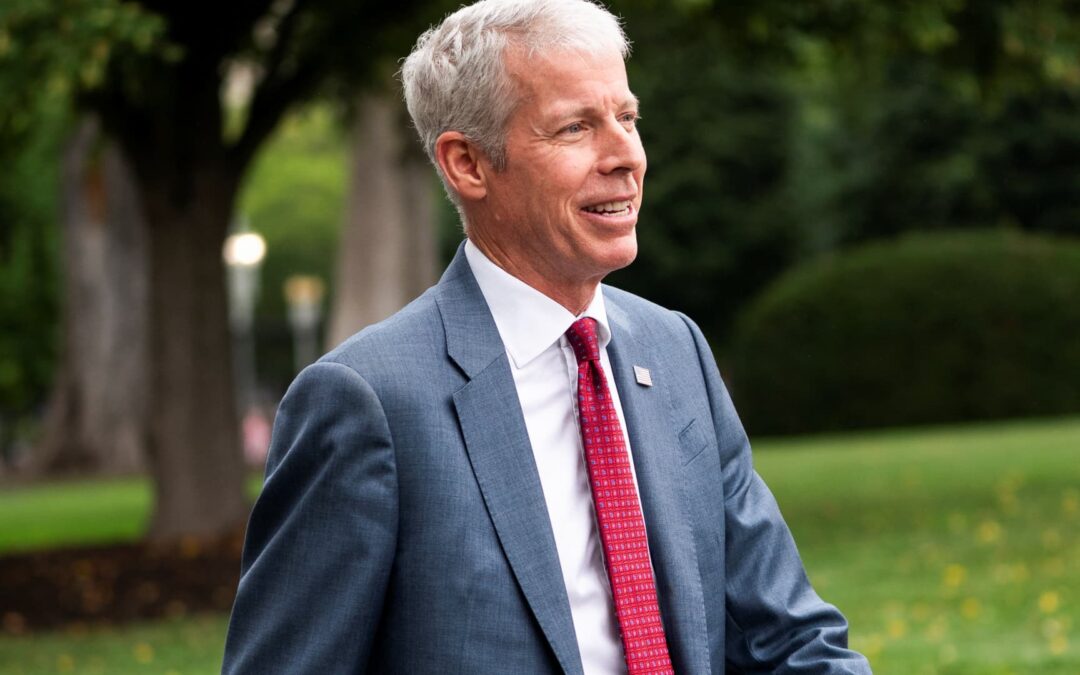U.S. Department of Energy Secretary Chris Wright walks near the West Wing of the White House in Washington, D.C., U.S., August 19, 2025.
Nathan Howard | Reuters
The Energy Department’s cancellation of more than 300 funding awards to projects in 16 states won by Democratic nominee Kamala Harris in the 2024 presidential election slammed the brakes on efforts to reduce carbon emissions, air and water pollution, and strengthen electrical grids.
The elimination of nearly $8 billion in funding for more than 200 projects could result in the loss of tens of thousands of jobs that would have been created by the projects, and undercut the Trump administration’s own stated goals of boosting American manufacturing competitiveness, critics said.
The cuts were announced on Wednesday, the first day of the federal government shutdown. Earlier Wednesday, the Trump administration froze a whopping $18 billion in funding for two massive infrastructure projects in New York City — the home of Congress’s two top Democrats.
President Donald Trump and congressional Republicans have blamed Democrats for the shutdown.
Senate Minority Leader Chuck Schumer, D-N.Y., on Thursday, referring to the Energy Department’s funding cancellations, said, “Instead of playing politics with the shutdown, President Trump should be working on bipartisan solutions to lower Americans’ costs and create jobs.”
“This goes beyond targeting blue states. It’s taking a wrecking ball to working families’ lives: putting construction workers out of a job and raising families’ electric bills for political gain,” Schumer said.
While some of the department’s cancellations first announced by Office of Management and Budget Director Russell Vought were new, others had been previously announced in May by the department.
Vought likewise trumpeted the funding freeze for a project to build a new rail tunnel connecting New Jersey to New York under the Hudson River, and to extend the Second Avenue subway in Manhattan, before the Department of Transportation formally announced the move.
A list circulated by the Energy Department on Capitol Hill on Thursday of all the cuts it was touting included some, but not all, of the May cuts. Cuts from May that affected projects in states that Trump won in the 2024 election were not included in the list, and none of the new cuts were in such states.
The rescinded awards had been issued by the Energy Department’s Offices of Clean Energy Demonstrations, Energy Efficiency and Renewable Energy, Grid Deployment, Manufacturing and Energy Supply Chains, Advanced Research Projects Agency-Energy, and Fossil Energy.
“There would have been significant emissions reductions from these projected,” said Ian Wells, a senior advocate at the National Resources Defense Council, an advocacy group. “Not only greenhouse emissions, but things that would lead to green air and water,” Wells said.
Wells noted that another large funding grant, which was cancelled in May, was $500 million earmarked for the Lebec Net-Zero project in Lebec, California, which aimed to produce carbon-neutral cement.
A similar, smaller project in Holyoke, Massachusetts, had awarded $87 million to Sublime Systems to build low-carbon cement manufacturing, which would have created between 70 and 90 jobs, Wells said.
Those projects “seemed to be in line with the administration’s priorities” of reinvigorating American manufacturing and competing with overseas competitors, with the benefit of helping the environment, he said.
“It’s potentially a ‘win-win-win,’ and that is potentially now being thrown out,” Wells said.
The Energy Department did not release the details of the 223 projects affected by the funding termination.
But Democrats on the House Appropriations Committee compiled a list of affected projects and released it on Thursday afternoon.
“The termination of these critical energy projects will increase energy prices, eliminate jobs, and make the energy grid less reliable,” the group said.
The terminated funding included $1.2 billion for a hydrogen hub in California under the so-called ARCHES program — The Alliance for Renewable Clean Hydrogen Energy Systems.
“Today’s decision to withdraw federal funding for ARCHES ignores the critical benefits our projects will deliver – including 220,000 American jobs and stronger national energy security and resilience,” said ARCHES CEO Angelina Galiteva in a statement.
“The ARCHES Ecosystem and Marketplace will continue to advance in collaboration with state leaders and private sector innovators – building on our strong foundation to create a reliable, future-focused domestic hydrogen network for California and beyond.”
Another $1.1 billion in grants for energy projects across Washington state, including the Pacific Northwest Hydrogen Hub, were cancelled by the Energy Department, according to Washington state officials.
“That hub will create a clean hydrogen economy across our region,” Washington Gov. Bob Ferguson said in a statement to CNBC.
“It is outrageous that this administration is using a government shutdown to punish blue states like Washington,” Ferguson said. “We’re working with the Attorney General’s Office to fight this illegal action.”
Chris Green, president of the Pacific Hydrogen Association, called the cancellation of federal funds for the hub “a gut punch.”
“We are, of course, very disappointed in that,” Green told CNBC, noting that the project could have led to tens of thousands or even hundreds of thousands of jobs.
He said that companies involved in the hub “were spending lots of their own money,” with about 80% of the committed funds being provided by private companies, with federal funds providing the remaining 20% or so of the costs.
“Can we still do this project now that we’ve lost 20% of our planned revenue?” Green asked. “It remains to be seen if some of these projects can persevere.”
The Colorado Energy Office said that more than 30 grants totalling more than $500 million “are being illegally terminated in Colorado alone.
Two of those grants each provide $2.5 million to support reduced energy use and create cost savings through building energy codes and building performance standards through decarbonization, the office said.
“Other terminated grants in Colorado range from oil and gas methane reduction projects and investments in grid resilience to support for utility programs in low-income communities,” the office said.
“This clearly politically motivated targeting of grants by the Administration will balloon energy costs, threaten grid reliability, increase pollution, and create instability in our business community,” the office said.
In New Mexico, 10 projects had more than $135 million of Energy Department funding cancelled.
Four of them were under the auspices of the New Mexico Institute of Mining and Technology, including one with $42.7 million from the Energy Department to “develop a storage hub at a commercial scale within San Juan basin to verify these sites can securely store 50 million tons of CO2,” according to the office of Sen. Martin Heinrich, D-N.M.
Heinrich, the ranking Democrat on the Senate Energy and Natural Resources Committee, said Thursday, “Minutes before the news of these cancelled projects broke, I had just left lunch with [Energy] Secretary [Chris] Wright and he had neither the courtesy nor the care to mention that this was coming, and that it included ten projects in my state — projects that affect real jobs and real families.”
“That tells you everything you need to know about how this Administration operates: in the dark and with no respect for the people hurt by their decisions,” Heinrich said in a statement.
“The American people deserve a government that works for them, not one that plays politics with their lives,” he said. This Administration is choosing to punish ordinary families just to settle scores — and that is as dangerous as it is un-American.”
The Energy Department, in a statement, said that the cancellations followed ” a thorough, individualized financial review,” which “determined that these projects did not adequately advance the nation’s energy needs, were not economically viable, and would not provide a positive return on investment of taxpayer dollars.”
Energy Secretary Wright said that many of the awards were “rushed through in the final months of the Biden administration with inadequate documentation by any reasonable business standard.”
“President Trump promised to protect taxpayer dollars and expand America’s supply of affordable, reliable, and secure energy,” Write said, adding that the cancellations “deliver on that commitment.”
The department said that of the 321 financial awards terminated, “26% were awarded between Election Day and Inauguration Day,” with those awards alone valued at more than $3.1 billion.
But Wells, the NRDC advocate, said that despite the Energy Department’s claims, “there’s been a confusing lack of transparency in this process of cancelling” funding.
Wells contrasted that to the Biden administration’s vetting of the projects before they were approved. He noted that the department itself had not publicly released a list of the cancelled projects.
The Energy Department did not respond to CNBC’s request for that list.
Wells pointed out that several Democratic members of Congress, including New Mexico’s Heinrich, in early September had raised concerns about the influence of political appointees in the Energy Department to cancel funding of projects in May.
“This is highly unusual and counter to longstanding DOE precedent,” Heinrich and two other Democrats, Representative Zoe Lofgren of California, and New Jersey Rep. Frank Pallone, Jr., wrote in a letter to Wright. “It also stands in stark contrast to the rigorous, merit-based process that the Department followed in selecting each of the awards.”
“These programs are not optional,” the lawmakers wrote. “These programs were enshrined into law by bipartisan majorities and they represent the will of Congress. You have no legal authority to sabotage them.”
Ken Lovett, the senior communications advisor on energy and environment for New York Gov. Kathy Hochul, said that the funding cuts “come as no surprise given the Trump administration’s full-on assault on clean energy.”
“Whether it’s blocking offshore wind, cutting federal incentives for electric vehicles and solar energy, or rolling back clean air and clean water standards, the Trump administration’s attempt to rollback the progress we have made puts New Yorkers’ well-being and safety at risk,” Lovett said in a statement.
“We will not go back.”
— CNBC’s Emily Wilkins, Ashlee Trujillo and MC Wellons contributed to this story.









